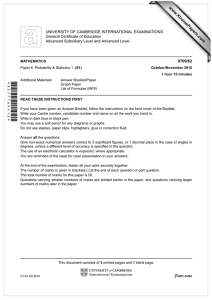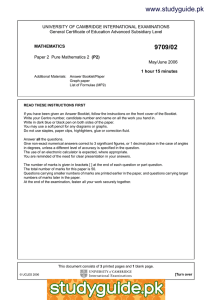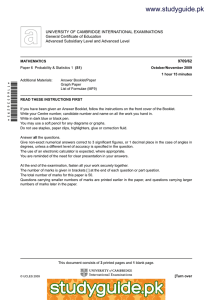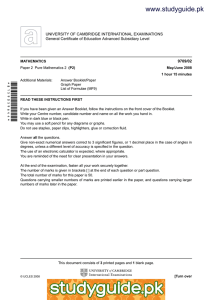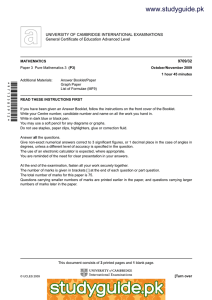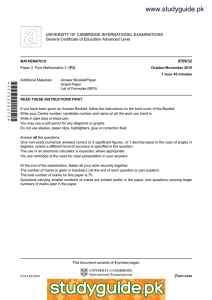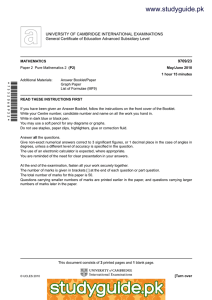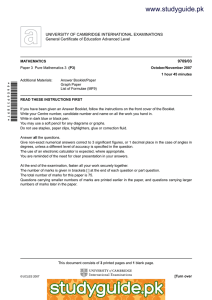www.studyguide.pk
advertisement
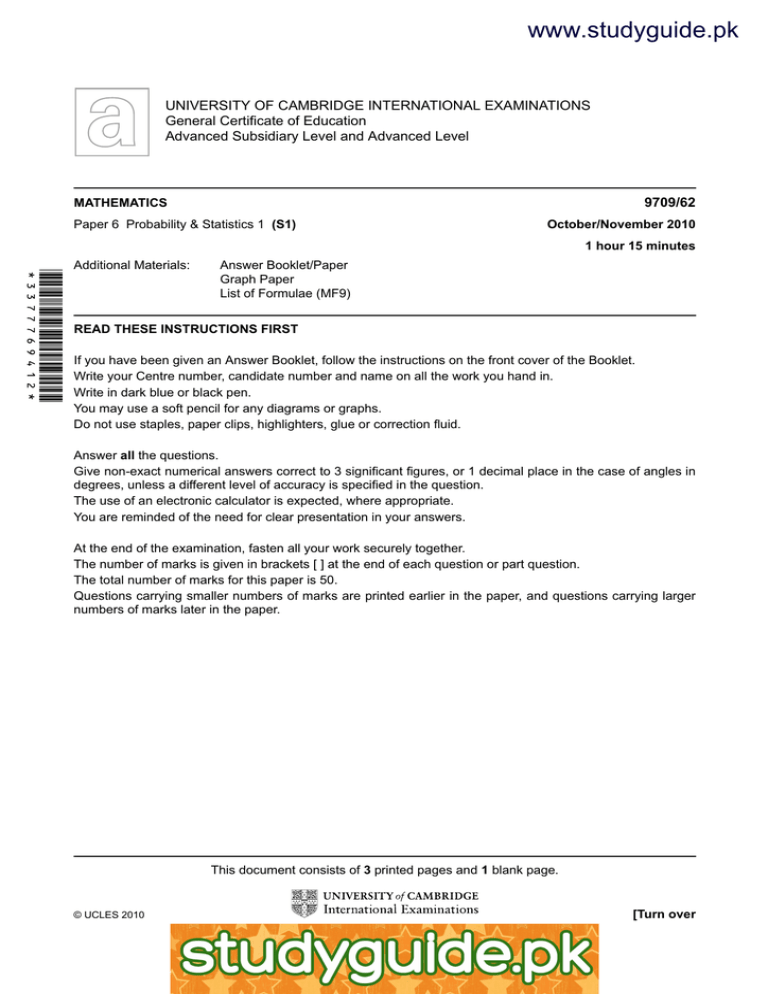
www.studyguide.pk UNIVERSITY OF CAMBRIDGE INTERNATIONAL EXAMINATIONS General Certificate of Education Advanced Subsidiary Level and Advanced Level 9709/62 MATHEMATICS Paper 6 Probability & Statistics 1 (S1) October/November 2010 1 hour 15 minutes *3377769412* Additional Materials: Answer Booklet/Paper Graph Paper List of Formulae (MF9) READ THESE INSTRUCTIONS FIRST If you have been given an Answer Booklet, follow the instructions on the front cover of the Booklet. Write your Centre number, candidate number and name on all the work you hand in. Write in dark blue or black pen. You may use a soft pencil for any diagrams or graphs. Do not use staples, paper clips, highlighters, glue or correction fluid. Answer all the questions. Give non-exact numerical answers correct to 3 significant figures, or 1 decimal place in the case of angles in degrees, unless a different level of accuracy is specified in the question. The use of an electronic calculator is expected, where appropriate. You are reminded of the need for clear presentation in your answers. At the end of the examination, fasten all your work securely together. The number of marks is given in brackets [ ] at the end of each question or part question. The total number of marks for this paper is 50. Questions carrying smaller numbers of marks are printed earlier in the paper, and questions carrying larger numbers of marks later in the paper. This document consists of 3 printed pages and 1 blank page. [Turn over © UCLES 2010 www.XtremePapers.net www.studyguide.pk 2 1 The discrete random variable X takes the values 1, 4, 5, 7 and 9 only. The probability distribution of X is shown in the table. x 1 4 5 7 9 P(X = x) 4p 5p2 1.5p 2.5p 1.5p Find p. 2 [3] Esme noted the test marks, x, of 16 people in a class. She found that Σ x = 824 and that the standard deviation of x was 6.5. (i) Calculate Σ(x − 50) and Σ(x − 50)2 . [3] (ii) One person did the test later and her mark was 72. Calculate the new mean and standard deviation of the marks of all 17 people. [3] 3 A fair five-sided spinner has sides numbered 1, 2, 3, 4, 5. Raj spins the spinner and throws two fair dice. He calculates his score as follows. • If the spinner lands on an even-numbered side, Raj multiplies the two numbers showing on the dice to get his score. • If the spinner lands on an odd-numbered side, Raj adds the numbers showing on the dice to get his score. Given that Raj’s score is 12, find the probability that the spinner landed on an even-numbered side. [6] 4 The weights in kilograms of 11 bags of sugar and 7 bags of flour are as follows. Sugar: 1.961 1.983 2.008 2.014 1.968 1.994 2.011 Flour: 1.945 1.962 1.949 1.977 1.964 1.941 1.953 2.017 1.977 1.984 1.989 (i) Represent this information on a back-to-back stem-and-leaf diagram with sugar on the left-hand side. [4] (ii) Find the median and interquartile range of the weights of the bags of sugar. 5 [3] The distance the Zotoc car can travel on 20 litres of fuel is normally distributed with mean 320 km and standard deviation 21.6 km. The distance the Ganmor car can travel on 20 litres of fuel is normally distributed with mean 350 km and standard deviation 7.5 km. Both cars are filled with 20 litres of fuel and are driven towards a place 367 km away. (i) For each car, find the probability that it runs out of fuel before it has travelled 367 km. [3] (ii) The probability that a Zotoc car can travel at least (320 + d ) km on 20 litres of fuel is 0.409. Find the value of d. [4] © UCLES 2010 9709/62/O/N/10 www.XtremePapers.net www.studyguide.pk 3 6 (i) State three conditions that must be satisfied for a situation to be modelled by a binomial distribution. [2] On any day, there is a probability of 0.3 that Julie’s train is late. (ii) Nine days are chosen at random. Find the probability that Julie’s train is late on more than 7 days or fewer than 2 days. [3] (iii) 90 days are chosen at random. Find the probability that Julie’s train is late on more than 35 days or fewer than 27 days. [5] 7 A committee of 6 people, which must contain at least 4 men and at least 1 woman, is to be chosen from 10 men and 9 women. (i) Find the number of possible committees that can be chosen. [3] (ii) Find the probability that one particular man, Albert, and one particular woman, Tracey, are both on the committee. [2] (iii) Find the number of possible committees that include either Albert or Tracey but not both. [3] (iv) The committee that is chosen consists of 4 men and 2 women. They queue up randomly in a line for refreshments. Find the probability that the women are not next to each other in the queue. [3] © UCLES 2010 9709/62/O/N/10 www.XtremePapers.net www.studyguide.pk 4 BLANK PAGE Permission to reproduce items where third-party owned material protected by copyright is included has been sought and cleared where possible. Every reasonable effort has been made by the publisher (UCLES) to trace copyright holders, but if any items requiring clearance have unwittingly been included, the publisher will be pleased to make amends at the earliest possible opportunity. University of Cambridge International Examinations is part of the Cambridge Assessment Group. Cambridge Assessment is the brand name of University of Cambridge Local Examinations Syndicate (UCLES), which is itself a department of the University of Cambridge. 9709/62/O/N/10 www.XtremePapers.net
